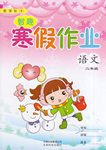题目内容
—So you missed the meeting yesterday.
—________.I got there five minutes before it was finished.
A. All right B.No problem
C.Not exactly D.Never mind
练习册系列答案
 智趣寒假作业云南科技出版社系列答案
智趣寒假作业云南科技出版社系列答案
相关题目
题目内容
—So you missed the meeting yesterday.
—________.I got there five minutes before it was finished.
A. All right B.No problem
C.Not exactly D.Never mind
 智趣寒假作业云南科技出版社系列答案
智趣寒假作业云南科技出版社系列答案